
If you’ve been having trouble unlocking your pesky iPhone while wearing a mask, you’re not alone.
As many of us are wearing facial coverings while out of the house to curb the spread of COVID-19, it’s proving difficult to use the Face ID unlocking feature in newer iPhones, like the iPhone 11. Luckily, an upcoming software update from Apple is making it easier to deal with the frustration, though not in the way you might think.
Among various bug fixes and improvements, Apple’s upcoming iOS 13.5 update includes a minor but important change to the iPhone lock screen. When you pick up a Face ID-capable iPhone, it usually prompts you to show your mug to the front-facing camera to get inside your device. Failing that, the iPhone asks you to enter your passcode — but it can take a few seconds before the passcode option appears.
With the upcoming update, iPhone users will be able to swipe up from the bottom of the lock screen to instantly jump to to the passcode option, manually and quickly bypassing Face ID. The update is currently in beta before being rolled out more widely.
Of course, using this option may mean your rarely-used passcode or uncomfortably long password will see a lot more use, which can eat up even more time. To make your passcode easier to enter (helpful when hauling groceries home) you can visit the Settings app, select Face ID & Passcode, and enter a new, shorter password. Just remember to keep it hard to guess — shorter passcodes can be easier to remember, but can also be less safe. You may also see the option to “Set Up an Alternate Appearance.” Before you get your hopes up, thinking you can just configure your iPhone to recognize you with your mask on, it unfortunately won’t work with a mask obstructing half your face.
While Apple’s Beta Program is open to everyone who wants to join, doing so isn’t recommended if your device is “mission-critical,” so to speak. Beta versions of software often contain bugs that may leave users vulnerable to glitches that could result in lost data, or exploits that have yet to be patched in that particular version. So it’s better to wait for this feature to come to the general public, which shouldn’t take long.
More Must-Reads from TIME
- Why Biden Dropped Out
- Ukraine’s Plan to Survive Trump
- The Rise of a New Kind of Parenting Guru
- The Chaos and Commotion of the RNC in Photos
- Why We All Have a Stake in Twisters’ Success
- 8 Eating Habits That Actually Improve Your Sleep
- Welcome to the Noah Lyles Olympics
- Get Our Paris Olympics Newsletter in Your Inbox
Write to Patrick Lucas Austin at patrick.austin@time.com